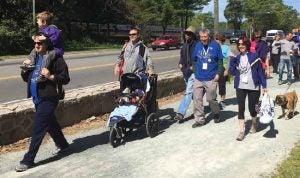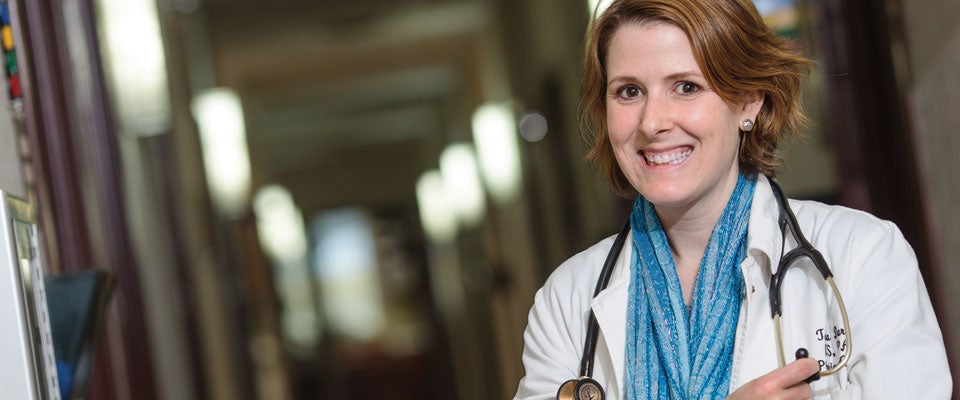Licensed to heal
Tanya Darrow '07 serves patients and students in rural N.C.
“Family medicine” has more than one meaning for Tanya Darrow ’07.
She and her husband, Mark, start each morning before daybreak with physical therapy treatments for their 6-year-old son, Gavin, who has cystic fibrosis.
About three hours later, after working out and feeding her infant son, Luke, she drops Gavin off at school then heads for her job as a physician assistant at Vance Family Medicine in Henderson.
“It’s a mix of urgent care and primary care all in one,” Darrow says of her practice, which has thousands of patients, from “babies to geriatrics. It’s truly ‘womb to tomb.'”
At least two Brody School of Medicine graduates and a couple of other ECU P.A. graduates practice there, putting ECU’s mission to serve the underserved to work every day.
“We’re not quite ready to paint it purple, but we’re close,” Darrow says. “We’re a big family here.”
Working for health
Darrow has practiced at Vance Family Medicine since graduating from ECU with a master’s degree in P.A. studies in 2007. In conjunction with a supervising doctor, physician assistants evaluate, diagnose and treat, provide counseling and prescribe medication.
The practice is open long hours and on Saturdays.
Situated on the Virginia line and Kerr Lake along Interstate 85 and U.S. 158, Vance County has a population of about 45,000. Henderson is the county seat and home to about 15,000. Unemployment is in the high single digits. More than a quarter of the population lives below the poverty line, according to Census figures.
Life expectancy, at 74.9, trails the state number of 78.3, according to state statistics. Cancer death rates exceed state averages, and deaths from chronic kidney disease are worse than national averages, according to the Centers for Disease Control and Prevention. Diabetes is rampant. Asthma hospitalizes children at a rate nearly 50 percent higher than the state as a whole.
Against that backdrop, Darrow works to make sure her patients grasp her explanations and participate in their care.
“If you don’t understand something, she will explain it until you do,” says 17-year-old Samaira Williams, who is interested in attending ECU to study anthropology.
“She makes things clear for you,” says Samaira’s mother, Samantha Williams. “She’s got a lot of patience whether it’s over the phone or face to face.”
Twenty years of training rural and underserved providers
Accredited in the fall of 1996, the mission of ECU’s physician assistant studies program is to prepare primary care providers and increase access to health care for citizens in rural and medically underserved areas.
The program is one of nine departments in the College of Allied Health Sciences, the leading university provider of allied health professionals in the state.
ECU’s first class of physician assistants graduated in 1999. Until recently, ECU had the only state-supported program in the University of North Carolina system. ECU has graduated 30 to 35 students a year since the program started, says Kim Stokes, clinical coordinator and clinical assistant professor in the P.A. studies program.
ECU has affiliations with 129 active clinical sites with 188 preceptors in North Carolina from Southport north to Edenton and west to Chapel Hill. “We focus on rural areas over urban,” Stokes says.
About 91 percent of ECU P.A. graduates stay in North Carolina to practice. And ECU graduates have consistently achieved a 100 percent pass rate on their state licensing exams.
Before they graduate, students work six-week rotations in family medicine, pediatrics, women’s health, general surgery, internal medicine, behavioral medicine and geriatrics, exposing students to a variety of specialties to choose from when entering the workforce.
Teacher and provider
Darrow worked as a research assistant and clinical trials coordinator at Duke University Health System before entering graduate school. Now, in addition to seeing patients, she mentors students as a preceptor, or clinical teacher.
“I like to think I’m providing students with a great experience that will help develop their skills and prepare them for providing excellent patient care,” Darrow said.
ECU was Darrow’s top choice because of its commitment to underserved areas of the state, as well as its low cost compared to other programs. “ECU’s efforts to train people who go on to serve in rural areas of the state was and still is my main focus,” Darrow says.
Darrow received a grant from the North Carolina Medical Society Foundation’s Community Practitioner Program, which helps medically underserved communities across North Carolina attract and retain needed practitioners. The program pays back some of the debt Darrow incurred as a student.
Kim Stokes, clinical coordinator and clinical assistant professor in the P.A. studies program in the ECU College of Allied Health Sciences, saw Darrow’s commitment to rural health when she was in Stokes’ clinical rotation in primary care at Med Center 1 in Greenville.

Darrow walks with her family and more than 300 other walkers in the Great Strides walk held April 16 in Durham to raise money for the Cystic Fibrosis Foundation.
“I noted a bright young lady with an eagerness to return to rural primary care, which truly meets the mission of our P.A. program,” Stokes says. “Almost every day of her clinic life, she is educating someone in the next graduating class. She never seems to burn out on educating students. We couldn’t ask for a more dedicated preceptor.”
At the outset, Darrow finds out more about each student, giving them an opportunity to ask questions or give suggestions on how they could learn better.
“Depending on previous rotations, some students are not as confident in certain areas and may need a little extra help,” Darrow says. “I’m very flexible in my teaching style because we all learn differently. That helps me provide an exceptional learning environment when I can for students.”
Darrow said it’s important to provide learning opportunities for students across the state in a fast-growing field.
“It’s becoming increasingly difficult for students to be placed in a quality environment where they can be exposed to various aspects of primary care,” Darrow says. “In one week (here), you can see a variety of cases and procedures. An experience like that can really push a student forward in his or her training.”
ECU alumna Brandy McBryde spent the summer of 2013 with Darrow at Vance Family Medicine.
“She always took the time to sit down and educate patients. Even when time was running short, she was teaching,” says McBryde, a P.A. in the emergency department of Harnett Health in Dunn and Lillington. “I believe this is a large part of our job. Managing someone’s health care needs isn’t a one-sided relationship, but a partnership that needs to be nurtured and guided.”
She says Darrow was constantly reading and referencing new material from medical journals.
“I was able to see firsthand the dedication that is required to practice in medicine,” McBryde says. “The learning doesn’t stop after you receive your degree; you are constantly changing your practice and improving upon your knowledge.”
Darrow said she enjoys teaching students, each of whom brings a different perspective and experience to the rotation. “They may have seen or heard something in another rotation that prompts them to ask a question that I can’t answer,” Darrow says. “We both continue to learn.
“As a P.A., you can grow as much as you want to,” she adds. “It’s why I chose it. The evolution is still there. It’s constantly growing and changing.”
